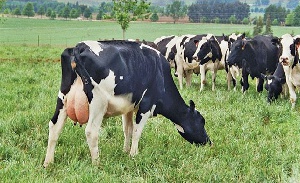Ranchers from the United States of America have signaled their interest in Ghana’s dairy market, as an investor proposes to bring in 4,400 heads of dairy cattle for a start.
The domestic dairy industry is increasingly generating interest from both local and international investors to establish a commercially productive domestic herd.
A report by the Global Agriculture Information Network (GAIN) reveals that in June, this year, the Ministry of Food and Agriculture (MOFA) accepted a USDA-proposed Veterinary Health Certificate for the export of cattle from the United States to Ghana.
The Chief Veterinary Officer of MOFA, Dr. Kingsley Micky Aryee, confirmed this to the Goldstreet Business, noting that the process is currently at the proposal stage
This bilateral protocol paves the way for suppliers and investors, who are keen to develop domestic cattle and dairy industries in Ghana.
Nonetheless, Dr Aryee was quick to say that the investor is actually ambitious of establishing a commercially productive domestic herd in the country.
“With 4,400 [heads of] cattle; if it succeeds, there is going to be a very big time employment directly and indirectly.
“This will minimise or completely eliminate the need for importation of huge volumes of milk by major companies,” Dr Aryee opined.
As Ghana’s population continues to grow, urbanize and steadily demand a more diversified diet, the country struggles to meet growing demand for dairy products.
More so, aside from yogurt, fresh dairy is still a rarity for many Ghanaian consumers.
In 2017, Ghana imported an estimated US$90 million in dairy and dairy products, of which the United States held a 1.5 percent market share.
Most imports from the European Union (EU), the largest supplier with a 67 percent market share in 2017, consisted of Ultra High-Temperature (UHT) pasteurized milk.
Aryee advised that the investor takes a clue from the case of Amrahia Dairy Farm, which failed to survive the test of time.
Currently, domestic dairy operations are very limited, and most local breeds do not provide the volume of milk necessary for a viable commercial operation.
In addition to the EU, New Zealand, Brazil and regional neighbours account for the majority of Ghana’s dairy imports.
The bulk of cattle trade occurs informally with neighbouring countries, most of which is not captured by official statistics.
It is expected that to ensure high-quality breeder cattle, genetics will play a role in expanding Ghana’s production.
Business News of Monday, 13 August 2018
Source: goldstreetbusiness.com













